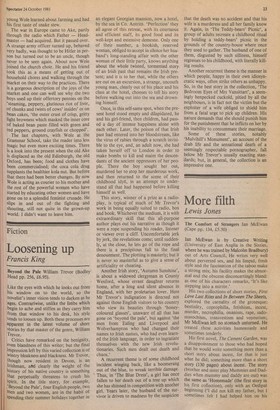Fiction
Loosening up
Francis King
Beyond the Pale William Head pp. 256, £6.95). Trevor (Bodleyl Like the eyes with which he looks out from his window on to the world, so the novelist's inner vision tends to darken as he ages. Contrariwise, unlike the linibs which begin to ache and stiffen as they carry him from that window to his desk, his style tends to loosen up. Both these processes are apparent in the latest volume of short stories by that master of the genre, William Trevor.
Critics have remarked on the benignity, even blandness of this writer; but the final impression left by this varied collection is of wintry bleakness and blackness. Mr Trevor, though now resident in Devon, is an Irishman, OW clearly the weight of the history of his native country is something that perpetually threatens to crush his spirit. In the title story, for example, 'Beyond the Pale', four English people, two men and two women, are in the habit of sPending their summer holidays together in an elegant Georgian mansion, now a hotel, by the sea in Co. Antrim. 'Perfection' they all agree of this retreat, with its courteous and efficient staff, its good food and its well-kept and extensive demesne. Only one of their number, a bookish, reserved woman, obliged to accept in silence her husband's long-standing affair with the other woman of their little party, knows anything about the whole twisted, tormented story, of an Irish past that remains the Irish present; and it is to her that, while the others are out on an excursion, a strange, uncouth young man, clearly out of his place and his class at the hotel, chooses to tell his story before walking out into the sea and drowning himself.
Once, in this self-same spot, when the present hotel stood empty and dilapidated, he and his girl-friend, then children, had passed a day of intense happiness alone with each other. Later, the poison of that Irish past had entered into her bloodstream, like the virus of rabies through a scratch invisible to the eye, and, an adult now, she had taken herself off to London in order to make bombs to kill and maim the descendants of the ancient oppressors of her people. There the boy sought her out, murdered her to stop her murderous work, and then returned to the scene of their childhood idyll, in an attempt to understand all that had happened before killing himself as well.
This story, winner of a prize as a radioplay, is typical of much of Mr Trevor's work in being equally suited to radio, box and book. Whichever the medium, it is with extraordinary skill that this all-purpose author plays out his narrative as though it were a rope suspending his reader, listener or viewer over a cliff. Uncomfortable jerk by jerk, the revelations come; until suddenly, at the close, he lets go of the rope and there is a precipitous fall to the final denouement. The plotting is masterly; but it is never so masterful as to give a sense of artificiality or cheating.
Another Irish story, 'Autumn Sunshine', is about a widowed clergyman in County Wexford, whose errant daughter returns home, after a long and silent absence in England, with her proletarian lover. Here Mr Trevor's indignation is directed not against those English visitors to his country who view its beauties through 'honeycoloured glasses', unaware of all that has gone on 'beyond the pale', but against 'the men from Ealing and Liverpool and Wolverhampton who had changed their names to Irish names, who had even learned the Irish language, in order to ingratiate themselves with the new Irish revolutionaries. Such men dealt out death and chaos.' A recurrent theme is of some childhood incident winging back, like a boomerang out of the blue, to wreak terrible damage. Thus, in 'The Blue Dress', a girl has once fallen to her death out of a tree up which she has shinned in competition with another girl. Years later, the husband of the survivor is driven to madness by the suspicion that the death was no accident and that his wife is a murderess and all her family know it. Again, in 'The Teddy-bears' Picnic', a group of adults recreate a childhood ritual by holding a teddy-bears' picnic in the grounds of the country-house where once they used to gather. The husband of one of them, disgusted by such silliness, himself regresses to his childhood, with literally killing results.
Another recurrent theme is the manner in which people, happy in their own idiosyncratic ways, often strike others as unhappy. So, in the best story in the collection, 'The Bedroom Eyes of Mrs Vansittart', a seemingly henpecked cuckold, pitied by all the neighbours, is in fact not the victim but the exploiter of a wife obliged to shield him from a fatal urge to pick up children. His nature demands that she should punish him for the punishment that he inflicts on her by his inability to consummate their marriage.
Some of these stories, notably 'Mulvihill's Monument', an account of the drab life and the sensational death of a seemingly respectable pornographer, fall below Mr Trevor's usually exacting stan"dards; but, in general, the collection is an impressive one.


































 Previous page
Previous page